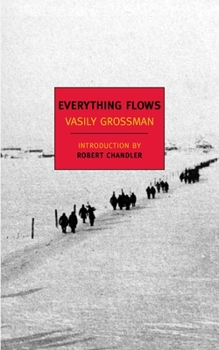Everything Flows
Select Format
Select Condition 
Book Overview
A New York Review Books Original Everything Flows is Vasily Grossman's final testament, written after the Soviet authorities suppressed his masterpiece, Life and Fate. The main story is simple:... This description may be from another edition of this product.
Format:Paperback
Language:English
ISBN:1590173287
ISBN13:9781590173282
Release Date:December 2009
Publisher:New York Review of Books
Length:272 Pages
Weight:0.60 lbs.
Dimensions:0.7" x 5.0" x 8.0"
Customer Reviews
5 ratings
Moving, Thoughtful & Important
Published by Thriftbooks.com User , 20 years ago
Vasily Grossman is something of a forgotten, unsung, giant of Soviet dissident authors. Born in Berdichev, Ukraine in 1905, Grossman rose to prominence and received national acclaim as a war reporter for Red Star, the official newspaper of the Red Army. Grossman's coverage of the Battle for Stalingrad was popular and well known. In fact, Grossman may have been the first reporter to tell the story of the Holocaust, beginning with his reports subsequent to the liberation of Treblinka in Poland. Prior to the publication (abroad) of Forever Flowing Grossman had seen his other major work, Life & Fate, banned by the KGB. In February 1961, a KGB Colonel, Vladimir Prokopenko came to Grossman's flat not to arrest Grossman but to arrest his novel "Life and Fate". Grossman's manuscripts, carbon copies, notebooks and typewriter ribbons were all seized. These events took contemporaneously with the authorized publication in the USSR of Solzhenitsyn's One Day in the Life of Ivan Denisovich. An explanation of why Grossman was perceived as more of a threat than Solzhenitsyn can be gleaned from the contents of Forever Flowing. (The story of the eventual publication of Life and Fate is best left to reviewers of that book.) "Forever Flowing" tells a simple, yet emotionally deep and politically nuanced tale. The story begins with the 1957 return to Moscow of Ivan Grigoryevich after 30 years of forced labor in the Gulag. (1957 marked the year in which the tide of returning prisoners of the Gulag reached its peak.) He arrives at the flat of his cousin, Nikolay Andreyevich. Nikolay, a scientist with less than stellar skills, has reached some measure of success at the laboratory through dint of being a survivor. He reaches the top of his profession only after those of his more talented colleagues are skimmed from the laboratory after purges (Stalin's last campaign - the Doctors Plot - seems to be referenced here) and other typical political campaigns. The meeting in the flat is entirely unsatisfactory for both parties. Nikolay is particularly upset (although he is not capable of figuring out why) as he sees his pale imitation of a life reflected through the prism of his cousin's 30 year journey. Grossman paints a vivid picture of Nikolay, more than a bit jealous that Ivan's light had always shone brighter than his own prior to Ivan's arrest. Nikolay suffers from the guilt of one who was not arrested and who is painfully aware of the choices he made to keep from being arrested. In that sense having Ivan sit across from him at the dinner table disturbs Nikolay no end because Ivan represents a mirror into which Nikolay can see only his own hollow reflection.Grigoryevich leaves Moscow for his old city of Leningrad, the place where he was first arrested in 1927. There, quite by chance, he runs into the person whose denunciation placed him in jail in the first place. Grossman here embarks on a discourse on the different types and forms of denunciation avai
Alexander Shuster
Published by Thriftbooks.com User , 23 years ago
One of the best books about not only a Soviet reality but also about Russian nationalism and imperialism that still exists today and probably will be "flowing forever".Highly recommended!!!
Moving Account of horrors of Bolshevism and Leninism
Published by Thriftbooks.com User , 23 years ago
A very moving account of the horrors of Bolshevism and Stalinism in Russia.The chapter that touched me the most was the story of a young mother who was taken away from her mother and child to Siberia where she eventually dies of disease and despair No decent human being could fail to be moved by this account of a nightmare that really happened It is told in the rich literary style that can only come from a Russian writer-bringing to life the horrors of Communist tyranny and the beauty of Russian life that survived it
ruddy good
Published by Thriftbooks.com User , 25 years ago
A moving and trenchant attack on the devastation and hypocrisy of Stalinism and Leninism on Russia. But not as powerful and unforgettable as Grossman's must-read masterpiece: "Life and Fate".
A profoundly moving masterpiece about Stalinist Russia.
Published by Thriftbooks.com User , 26 years ago
Grossman began writing this book in 1955, two years after Stalin died. It was completed one year before the author's death in 1964, but was not published until 1970. Framed as a novel, and written with great tenderness, "Forever Flowing" is primarily a history of the horrors of the Soviet state before, during, and after its Stalinist phase. Grossman's chapters recounting the huge famine of 1932, which was a government-enforced starvation of millions, particularly in the Ukraine, are matchlessly brilliant and profoundly moving. The entire novel is a tribute to human freedom. It also reflects the great courage of its author. In my opinion, "Forever Flowing" will become more widely read as time passes, and will become increasingly recognized as one of the greatest books of the 20th century. It is a true classic. The lucid translation by Thomas P. Whitney is excellent. Very highly recommended!






